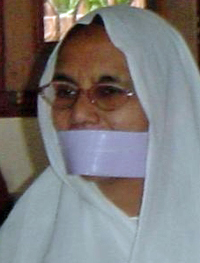In 1954, a conference on Anuvrat was organized in Mumbai under the guidance of Acharya Tulsi. Mumbai's reputed scholars, writers, and enlightened thinkers participated and presented their thoughts on the topic of Anuvrat.
During this period in Mumbai many learned people were influenced by the Anuvrat movement. Despite positive momentum of his ideas, Acharya Shree wished to make Anuvrat more practical to follow and he discussed methods of making the ideas more accessible with other visionaries and thought leaders.
Jainendraji, a well respected scholar of his time suggested Acharya Tulsi to revise the policy of Anuvrat to make it more practically applicable by more precisely defining the resolutions. Dr. 5ampurnanda, the Chief Minister of Uttarpradesh, echoed this sentiment and suggested that the movement would gain more ground if the resolutions were limited and put into context. Initially there were 84 Anuvrat vows, too many for the majority of people to follow with ease. Jayaprakash Narayan, the independence activist and political leader was very impressed by Acharya Tulsi and the Anuvrat movement and he participated in a set of detailed discussions with Acharya Tulsi to upgrade the Anuvrat.
The three day discussion consolidated Anuvrat from 84 to 11 rows embodying the code of conduct of Anuvrat:
- I will deliberately not kill any innocent creature
- I will not commit suicide
- I will not commit foeticide
- I will not attack anybody
- I will not support aggression
- I will endeavour to bring world peace and disarmament
- I will not take part in violent agitation or any destructiv activity
- I believe in human unity
- I will not discriminate on the basis of colour, race, gender nor will I treat anyone as lower caste
- I will practice religious tolerance
- I will not stimulate sectarian violence or uprising
- I will be honest in business and general behavior
- I will not harm others for any purpose
- I will not deceive anyone
- I will practice continence and limit material possessions
- I will not apply unethical means in elections
- I will not encourage or practice evil social customs
- I will lead a life free from addiction
- I will not use stimulants including alcohol, drugs, tobacco, etc.
- I will strive to minimize environmental pollution
- I will not cut the trees down
- I will not waste water
Vow number 8 'I will not apply unethical practice in elections', impressed the then Indian Chief Election Commissioner, T.N. Seshan, so much that he wanted Acharya Tulsi to stay in New Delhi in April, believing that his presence in the capital would contribute to perfect and peaceful elections.
 Sadhvi Vishrut Vibha
Sadhvi Vishrut Vibha
